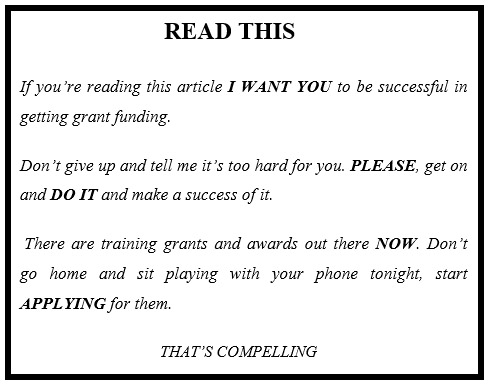HOW TO APPLY FOR GRANTS
The honourable art of Grantsmanship
I HOPE YOU AREN’T DISAPPOINTED… you maybe thought you were going to read reminders of the need to fill in the grant application form fully, get your name right and write a glowing CV without a ring of suggestio falsi to it. This is all necessary but you can get such good advice from plenty of other websites. We’ll suggest a few to look at first.
- www.startuploans.co.uk/business-advice/get-small-business-government-grant/
- www.lendingcrowd.com/blog/top-tips-on-how-to-apply-for-small-business-grants/
- www.thebalance.com/how-to-find-and-win-small-business-grants-2951180
- www.grantcentral.com/part-4-dangerous-words-to-avoid-in-grant-applications/
The reason people read these sites is to try to get ahead in the grant application process. Anyone can read them of course, thereby putting everyone back on a level playing field. They are still useful but, before you start applying for any grants or awards, spare a thought, if you will, for the honourable art of grantsmanship.
The honourable art of grantsmanship
Skeptics might argue that this is not the way you should be doing it. Here at Matthews Integrity Hub: HEAD OFFICE we disagree. In a previous employment life one of our website contributors has obtained rafts of EU and UK government funding this way, so it seems to work. Follow the few simple steps;
First step: You need the grant MINDSET
The grant mindset starts with the acceptance that some organization should want to provide you with free money. See our article the principles of free money to understand why they might want to do this. To better understand why you would want to receive money like this it helps to admit that you are a mild victim of a dependency culture; a little disease that affects people and organizations from time-to-time.
Some people have a problem admitting this last one. If that’s you then the good news is that you can explain it away to yourself using a skill you have called confabulation. To get a bit formal for a moment, confabulation is defined as the production of fabricated, distorted, or misinterpreted memories about oneself, without the conscious intention to deceive. We can all do it. Basically, you rationalize reasons in your own mind why you should, even must, apply for free money and very soon you perceive these reasons as being absolutely real. You feel no dependency culture in your thoughts and see no deception either, because that’s the way confabulation works. Once you have adopted the grant mindset (or it has adopted you) then the last two steps are easy.
Step two: Treat the whole thing like a lottery competition
You are entering a competition because you want the prize. You probably won’t win a prize if you only enter one competition because lots of others want to win it also. This simple logic suggests that, like buying a lottery ticket every week, you need a continuous rolling programme of grant applications if you are to have much success.
You can see evidence of this idea in action all around you. Universities, vocational training establishments, research facilities, regional development councils, all the arts, sciences, charities, sports, even countries, have people and departments doing nothing else but making grant applications. They all run continuous rolling programmes of applications. One large recruitment website, today, lists just under 1500 positions available under the search term ‘grant application jobs’ so it’s a busy area.
Its difficult to see any doubt; running a continuous rolling programme of grant applications forms an essential part of grantsmanship.
Step three: Get yourself a compelling story
The world of grant applications is littered with the rejection of good ideas that were poorly marketed. When you prepare the information for your grant applications its not enough to put your requirements, personal profile, project summary etc into dry lists of words; you have to give life and shout meaning into them. You have to make them feel compelling.
Compelling is making your grant application sound like it fits exactly the reason the grant funds are available. Compelling is making it sound like you have put so much thought into the application that the other applicants are just bit-players. Compelling means making whoever reviews your application feel as if they are part of the story. If you don’t make it compelling it probably won’t be successful and they’ll have to pick one of their stock reasons for rejecting it. So get yourself a compelling story and weave it into your applications.

That is the honourable art of grantsmanship. Now you can go back to the websites referenced at the start and use them to help you fill in the detail.
See how our Matthews Integrity Notes: HEAD OFFICE website contributors got on in their search for funding in Our search for funding article.
Please check out our Funding Factsheet
We’ve listed some useful funding-related sites on our funding factsheet . We are nothing to do with any of these sites so can’t vouch for their content, but we found then amongst the most sensible ones that we got involved with.
Matthews Integrity Hub: HEAD OFFICE is OPEN EVERY DAY….0730 – 2200 Monday – Sunday…That’s correct, all week, every week, including holidays
 If we happen to miss your call, leave a message and we will call you back just as soon as we pick it up. Sorry, there’s no automated messages, call queueing, voice recognition tools or canned music. Try it and see.
If we happen to miss your call, leave a message and we will call you back just as soon as we pick it up. Sorry, there’s no automated messages, call queueing, voice recognition tools or canned music. Try it and see.
CONTACT US
Tel: 07746 771592 help@matthewsintegrity.co.uk





